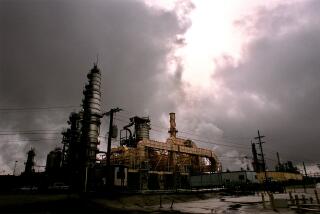Why Saudis Are So Accommodating : Oil prices may not rise, despite a falloff in Soviet production
The Soviet Union has long been the world’s biggest oil producer, but decades of mismanagement and more recent political upheaval have taken their toll. Production is falling, threatening not just local fuel shortages but higher prices on the international oil market, something the world’s recession-battered economies can happily do without.
Soviet oil output has dropped more than 12% in the last three years, down to 10.5 million barrels a day, with further declines expected. That has cut exports to Eastern and Western Europe by 1.5 million barrels a day, costing Moscow precious hard currency and sending European customers looking for new suppliers.
But so far, even with Iraq out of the export market because of a U.N.-imposed boycott, there has been enough oil to meet world needs without a jump in prices. A rise in oil demand is expected this winter, however. Without a commensurate rise in supplies, that would invite perhaps sharply higher prices.
The good news is that supplies probably will be ample, thanks to Saudi Arabia, which sits atop the world’s largest known oil reserves. Since July the Saudis have quietly increased their oil production by up to 500,000 barrels a day over what they consume or are under contract to sell. So far that has put an extra 60 million barrels or so in storage, some on land, some on tankers. The stored oil is a counter against expected efforts by some producers to push for price increases at this month’s OPEC meeting. And it’s a clear signal to the world that, Soviet crisis or not, the Saudis intend to keep oil plentiful in the months ahead.
Saudi Arabia’s policy is clear. For the time being it wants to keep oil prices pretty much where they are, around $19 a barrel. One reason--a responsible one--is that it doesn’t want to see a repeat of the two oil shocks of the 1970s, when soaring prices led to worldwide economic decline. Another reason is that the Saudis know--looking again at the experience of the 1970s--that if prices rise too much, investment in alternative fuels will increase, further reducing oil demand and jeopardizing the future market for the only thing the Saudis have to sell.
So while the Saudis are being internationally responsible, they’re also being prudent managers of their resources. The result, whatever the motivation, should be good for the world economy--plentiful oil supplies at stable prices in the months ahead.
More to Read
Sign up for Essential California
The most important California stories and recommendations in your inbox every morning.
You may occasionally receive promotional content from the Los Angeles Times.










